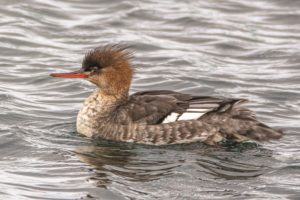PROVINCETOWN — Within the silence of the snowstorm, I walk the frozen beach, boot-crunch the only sound accompanying me. The muffled white air swirls and eddies. And then I hear it: from out over the water, across the sand, to me — the most recognizable and readily identifiable and fundamental animal sound, one that might be the first that children learn:
“Quack … quack — quack!”
Is there a happier noise in this world?
Through the mist, I see two Black Ducks out in the water, facing each other and conversing (about what, we will never know). They are the only dark forms in an otherwise white world.
What an absolute miracle these ducks are! What emissaries from the natural world: coming to us in the middle of a pandemic, political turmoil, and inclement weather. What balm they can bring to the mind prepared to fully take them in. How they manage to not only survive but thrive in the harshest of environments, without complaint or clamor.
Actually, winter is the best time of year to see and hear ducks on Cape Cod. One can easily encounter a half dozen — and with a bit of effort, perhaps a couple of dozen — species of ducks and geese in our bays, ocean, lakes, and ponds. (There are far fewer in summer, when most leave for the north, to nest).
The ducks range from the smallest, the Bufflehead, described in one field guide as resembling a bathtub rubber ducky, bobbing up and down, to the large and bulky Common Eider. Geese and swans, of course, are larger still.
 The facts about these feathered friends are astounding. They successfully spend time in all three elements — air, water, and land, although they are least elegant on land. A Long-Tailed Duck (a kind of sea duck) can dive up to 200 feet and stay underwater for over five minutes. Surf Scoters (another sea duck species) swallow mussels whole and crush the shells later, in their gizzards. Ducks are not just getting by in this weather; they are courting and having sex, always in the water.
The facts about these feathered friends are astounding. They successfully spend time in all three elements — air, water, and land, although they are least elegant on land. A Long-Tailed Duck (a kind of sea duck) can dive up to 200 feet and stay underwater for over five minutes. Surf Scoters (another sea duck species) swallow mussels whole and crush the shells later, in their gizzards. Ducks are not just getting by in this weather; they are courting and having sex, always in the water.
Speaking of sex, a male duck is one of the few birds to have a penis — and it is corkscrew-shaped. Male ducks are some of the most gorgeous of all birds, because their female counterparts choose mates on the basis of beauty, so that they produce ever more gorgeous sons.
But to explain these facts is to “unweave the rainbow” rather than just enjoy it. So I won’t go too far into the countercurrent heat exchange that exists in a duck’s feet — arteries and veins intertwined so warm blood from the body takes the chill off the cold blood from the toes. Or the fact that their feathers are so tightly interlocked and bound and oiled that they are truly waterproof.
Annie Dillard said, “The great hurrah about wildlife is that it exists at all; and the even greater hurrah is the actual moment of seeing it.”
So, go out and find yourself a duck. It is not difficult and will do you good. Just head for any body of water. And it is not weather-dependent. Whatever it is doing outside, they’ll be there.



